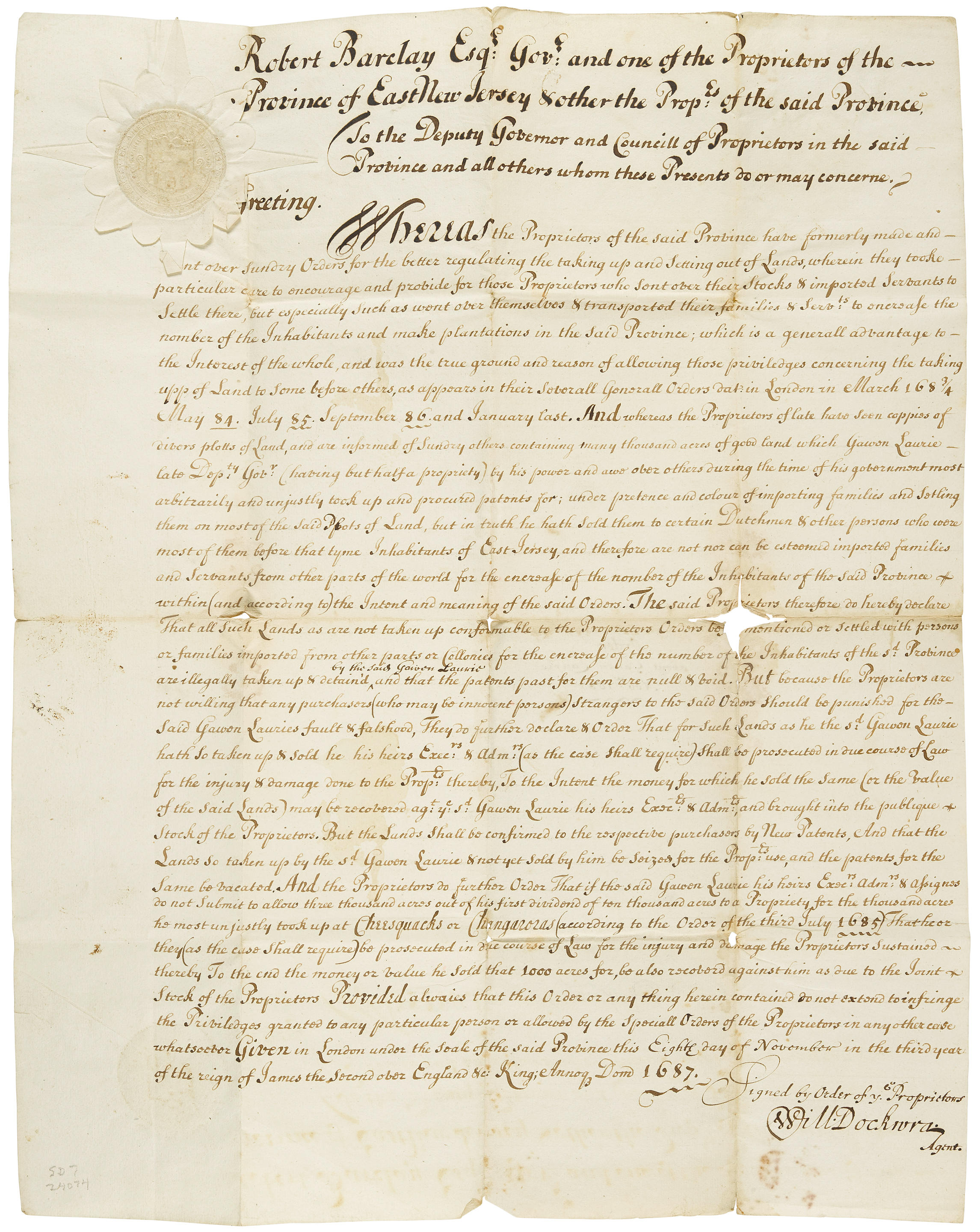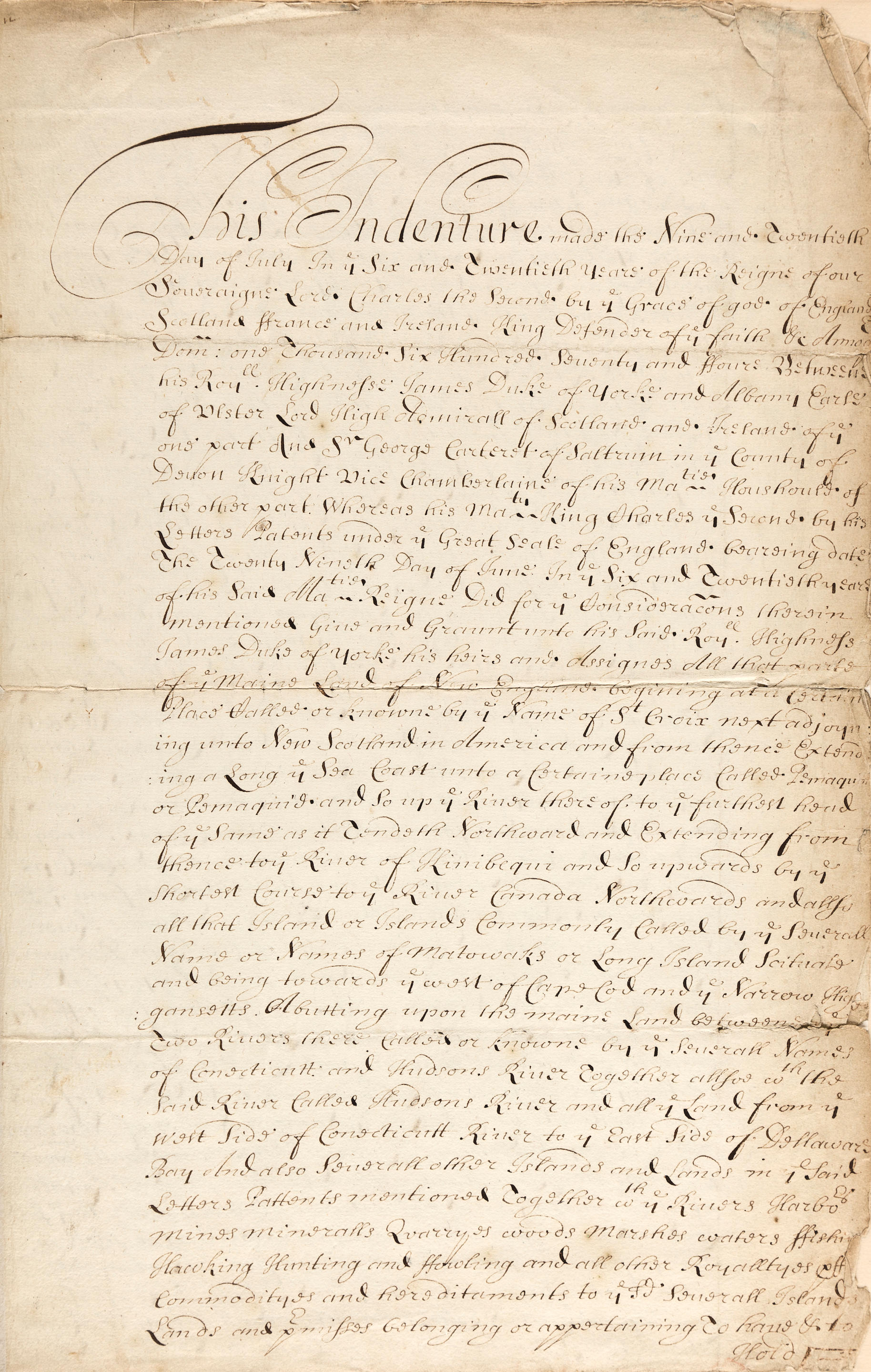EAST NEW JERSEY -- Document, 'The Fundamental Constitutions for the Province of East New Jersey in America', the scheme of government for the colony devised by the Twenty-Four Proprietors in London, signed by 17 proprietors including Robert Barclay as Governor, n.p. [London], n.d. [1683]. Manuscript in ink on vellum, four sheets (nos. 1, 3, 4 and 5, sizes 380 x 685 - 510 x 685mm) , incomplete (lacking the 2nd sheet including text of articles 4 - 6 and part of 3 and 7; two large fragments cut away from head of 1st sheet affecting one word of title and preamble; small tears in outer and lower margins, a few tiny holes and splits with slight loss of text in sheets 3 -5; slight discolouration). The document is signed on the last sheet by Robert Barclay, Lord Perth, Gawen Laurie, Thomas Cooper, Robert Barker Robert Burnet, John Drummond, Thomas Hart Richard Mew, Thomas Barker the same as proxy for Ambrose Rigg, Bartholomew Gibson, William Dockwera, Avent Sonman, William Gibson Clement Plumstead and the same as proxy for Robert Turner Following prolonged discussions throughout 1683 on the appropriate form of administration for their newly acquired province, the twenty-four proprietors in London adopted the provisions enshrined in the present document. The 24 articles reflect their perception of a model form of government, and have been labelled 'fantastic' on account of their complexity. The first, and straightforward provision is that Robert Barclay should be Governor 'during his natural life', and serve through a Deputy to be appointed by sixteen of the proprietors; but Barclay's successor is to reside in East Jersey, and be appointed for three years only. More complex arrangements provide for government by a Council of twenty-four, and a Great Council with 144 deputies, for whom an elaborate system of rotation will be imposed, with annual elections and variable qualifications for voters. The articles encompass the nomination of officials, the choice of magistrates and constables, trials by jury and qualifications of the proprietors who must retain a fourth of their Proprieties in order to retain their right of government. All persons acknowledging 'One Almighty God ... shall in no way be molested or prejudged for their Religions and persuasions and activities in matters of ffaith and worship ... Nor by this article is it intended that Any under the Notion of this Liberty shall allow themselves to avow Atheism or Irreligiousness or to practice coursing, swearing, drunkeness, prophaness, whoreing, adultery, murdering or any kind of violence or indulging themselves in Stage-Plays, Masks, Revells or suchlike abuses'. The remaining articles cover other legal and civil requirements in the colony. The Fundamental Constitutions, in many ways typical of the more doctrinaire schemes of the day, differed in various aspects from the Concessions and Agreements for New Jersey published by Berkeley and Carteret in 1664. Barclay and his fellow-proprietors regarded their own model as superior. The Constitutions were not completed when Thomas Rudyard left to represent Barclay in the province, but were taken out by Gawen Laurie in February 1684. Laurie appears to have disliked them and made little attempt to effect the new scheme. It would in any case have proved unpopular and probably unworkable. Its benefits were available only to those who agreed to a re-appraisal of their grants, and those who did not would be left with the original Concessions, so making a two-tier system inevitable. The document is of historic interest in reflecting the twenty-four proprietors' view of the most desirable form of government, and it foreshadowed other somewhat impracticable proposals which followed, particularly in relation to the granting of land and the collecting of quit rents. In 1686 Laurie ventured an enquiry of the house of deputies as to the 'scheme of Government formerly given them', to which the deputies answered that the Fundamental Constit
EAST NEW JERSEY -- Document, 'The Fundamental Constitutions for the Province of East New Jersey in America', the scheme of government for the colony devised by the Twenty-Four Proprietors in London, signed by 17 proprietors including Robert Barclay as Governor, n.p. [London], n.d. [1683]. Manuscript in ink on vellum, four sheets (nos. 1, 3, 4 and 5, sizes 380 x 685 - 510 x 685mm) , incomplete (lacking the 2nd sheet including text of articles 4 - 6 and part of 3 and 7; two large fragments cut away from head of 1st sheet affecting one word of title and preamble; small tears in outer and lower margins, a few tiny holes and splits with slight loss of text in sheets 3 -5; slight discolouration). The document is signed on the last sheet by Robert Barclay, Lord Perth, Gawen Laurie, Thomas Cooper, Robert Barker Robert Burnet, John Drummond, Thomas Hart Richard Mew, Thomas Barker the same as proxy for Ambrose Rigg, Bartholomew Gibson, William Dockwera, Avent Sonman, William Gibson Clement Plumstead and the same as proxy for Robert Turner Following prolonged discussions throughout 1683 on the appropriate form of administration for their newly acquired province, the twenty-four proprietors in London adopted the provisions enshrined in the present document. The 24 articles reflect their perception of a model form of government, and have been labelled 'fantastic' on account of their complexity. The first, and straightforward provision is that Robert Barclay should be Governor 'during his natural life', and serve through a Deputy to be appointed by sixteen of the proprietors; but Barclay's successor is to reside in East Jersey, and be appointed for three years only. More complex arrangements provide for government by a Council of twenty-four, and a Great Council with 144 deputies, for whom an elaborate system of rotation will be imposed, with annual elections and variable qualifications for voters. The articles encompass the nomination of officials, the choice of magistrates and constables, trials by jury and qualifications of the proprietors who must retain a fourth of their Proprieties in order to retain their right of government. All persons acknowledging 'One Almighty God ... shall in no way be molested or prejudged for their Religions and persuasions and activities in matters of ffaith and worship ... Nor by this article is it intended that Any under the Notion of this Liberty shall allow themselves to avow Atheism or Irreligiousness or to practice coursing, swearing, drunkeness, prophaness, whoreing, adultery, murdering or any kind of violence or indulging themselves in Stage-Plays, Masks, Revells or suchlike abuses'. The remaining articles cover other legal and civil requirements in the colony. The Fundamental Constitutions, in many ways typical of the more doctrinaire schemes of the day, differed in various aspects from the Concessions and Agreements for New Jersey published by Berkeley and Carteret in 1664. Barclay and his fellow-proprietors regarded their own model as superior. The Constitutions were not completed when Thomas Rudyard left to represent Barclay in the province, but were taken out by Gawen Laurie in February 1684. Laurie appears to have disliked them and made little attempt to effect the new scheme. It would in any case have proved unpopular and probably unworkable. Its benefits were available only to those who agreed to a re-appraisal of their grants, and those who did not would be left with the original Concessions, so making a two-tier system inevitable. The document is of historic interest in reflecting the twenty-four proprietors' view of the most desirable form of government, and it foreshadowed other somewhat impracticable proposals which followed, particularly in relation to the granting of land and the collecting of quit rents. In 1686 Laurie ventured an enquiry of the house of deputies as to the 'scheme of Government formerly given them', to which the deputies answered that the Fundamental Constit














Testen Sie LotSearch und seine Premium-Features 7 Tage - ohne Kosten!
Lassen Sie sich automatisch über neue Objekte in kommenden Auktionen benachrichtigen.
Suchauftrag anlegen